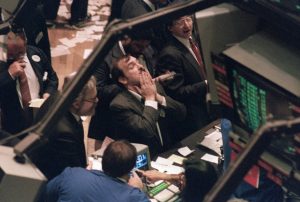The 5 mistakes that wealthy investors always avoid

To avoid making the biggest mistakes when investing, there are a few golden rules to follow. These are basic principles shared by all professionals in the industry and often repeated endlessly. And that’s precisely because instinct prompts investors to fall into the same traps on time. The American broadcaster cnbc has Summary The five biggest mistakes investors make (and which “the rich never make”).
The 5 mistakes wealthy investors avoid
Don’t diversify
If you put everything on one card, the risk increases and it is not possible to manage your savings properly. If the goal is not to “bet” small amounts, but to seek a more reliable return over time, it is necessary to balance your portfolio in different asset classes (stocks, bonds, currencies, commodities, real estate, etc.) by focusing on different ones Industry sectors. This way, when some asset classes, such as stocks, perform poorly, the loss can be offset by other investments that tend to do well in the same circumstances.
Investing follows the fashion of the moment
The fear of missing out on the investment of the century and the tendency to be swayed by the latest fashion trends can lead to eye-popping mistakes. Anyone who has been affected by Bitcoin, for example, knows it well. When you follow a trend, you take big risks. For this reason, most experts at the time of the Bitcoin mania had advised caution and, at most, investments that you can afford to lose. It’s far better to invest in stocks you’re familiar with, as multi-billionaire Warren Buffett used to teach. Rarely is it a good idea to take advantage of the euphoria of a swelling bubble.
You have no long-term plans
The wealthy investor is less interested in short-term profits and aims for forward-looking wealth accumulation. Planning for the coming decades is an exercise that helps to invest in a goal-oriented manner and deal with the challenge more clearly.
panic
When serious mistakes have been made beforehand, such as poor diversification based on short-term logic, it can be almost impossible to resist the bad weather of the markets. When stocks collapse, selling “materializes” the loss: this is why having enough liquidity to face the “bear market” is important. Being forced to sell at the wrong time because there are no alternatives is a situation to be avoided. When the specter of a bear market approaches, portfolio allocation managers tend to favor cash in order to take advantage of the downside in securities and buy cheaply.
Do everything yourself
Owners of large properties rarely regulate everything alone: a “good advisor“In addition, it’s also a way to relieve stress,” he explained Ivory Johnson, Founder of Delancey Wealth Management. A financial planner can help you reduce risk – and losses when markets suffer. The price of this experience is often more than balanced in the long run.
The strategies of the 5 most famous wealthy investors
Warren Buffett
According to Warren Buffett, his investment strategy is “85% Graham and 15% Fisher”. Buffett was a student of Benjamin Graham (Father of “Value Investing”) at Columbia Business School, where he learned from his professor the investing technique based on identifying three components: the value of assets, the value of margins as things stand, and the value of waiting for growth.
Fisher has been a staunch advocate of long-term investing, advising investors to hold the stock until fundamentals change or until the company reaches a point beyond which it can no longer grow faster than the economy at large.
Ray Dalio
The investment strategy of Ray Dalio, the founder of Bridgewater Associates (whose helm he left in October 2022) is primarily based on an understanding of the economic cycles affecting financial markets. Another important tenet of Dalio’s strategy is asset diversification.
Dalio also uses a “thorough research” approach to identify investment opportunities and employs active portfolio management. He is considered a prudent investor who can reduce risk and take advantage of opportunities that the financial markets offer in times of uncertainty. His approach is based on a combination of quantitative and qualitative analysis to make informed and evidence-based investment decisions.
George Soros
Soros’ strategy is therefore based on identifying moments when there is a discrepancy between an asset’s intrinsic value and its market price. Once this gap is identified, Soros invests in various financial instruments such as stocks, bonds, currencies and derivatives to profit from price movements.
Soros is also known for his ability to anticipate economic and political change. For example, in 1992 he made billions of dollars by speculating against the British pound in anticipation that the economic crisis would hit the UK.
In addition, Soros has adopted a strategy based on Karl Popper’s epistemology. According to this strategy, Soros actively questions his beliefs and adapts to new information and changing circumstances. This has helped him remain flexible and adaptable over time.
John Bogle
Bogle, who died in 2019, founded the mutual fund company Vanguard in 1974 and launched the first index fund, the Vanguard 500, in 1976. His investment philosophy is known as “buy and hold” or “invest and forget”. This approach aims to minimize investment costs and generate long-term returns without trying to beat the market. It is believed that most investors fail to outperform the market over the long term. Therefore, it is more cost-effective to take a passive approach that tracks market indices rather than trying to pick individual stocks or betting on actively managed funds.
Bogle emphasized the importance of minimizing investment costs such as brokerage commissions and mutual fund management fees.
Carl Icahn
Carl Icahn’s strategy is essentially based on three main pillars: buying and selling stocks, using activism to influence the management of the companies in which he invests, and using financial leverage.
When buying and selling stocks, Icahn tends to buy stocks in companies that he believes are undervalued by the market.
As an activist investor, try to influence company governance and strategy to improve performance.
Finally, Icahn also uses leverage to increase investment returns, but this also carries a higher risk of loss.





